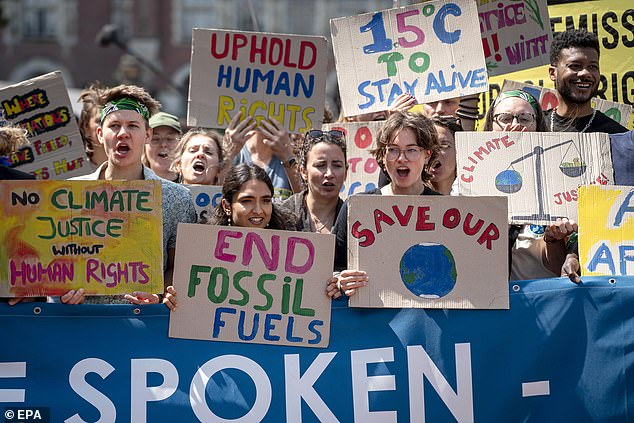The UK could be sued over its contribution to climate change after a court ruling that countries are responsible for their emissions.
The International Court of Justice said nations are obliged to comply with climate treaties and failure to do so was a breach of international law.
While the ruling is non-binding, it is likely to influence legislation globally and may open the floodgates to a series of court cases against countries such as the UK.
Despite being advisory, there are fears it could be enshrined in law by Labour, who, under the guidance of Attorney General Lord Hermer, have an ‘ideological obsession’ with international law, the Tories warned on Wednesday night.
Campaigners hailed the ruling as a victory for small nations affected by climate change over big polluters such as the US and China.
Judge Yuji Iwasawa, the court president, said: ‘Failure of a state to take appropriate action to protect the climate… may constitute an internationally wrongful act.’
Environmental lawyers said the judgment would lead to a rise in court cases over climate change.
Danilo Garrido, legal counsel for Greenpeace, said: ‘This is the start of a new era of climate accountability at a global level.’

The UK could be sued over its contribution to climate change after a court ruling that countries (such as Vanuatu, pictured in 2015 after Cycline Pam) are responsible for their emissions

Climate activists and campaigners demonstrate outside the International Court of Justice

Campaigners hailed the ruling as a victory for small nations affected by climate change over big polluters such as the US and China
Sebastien Duyck, at the Centre for International Environmental Law, laid out the possibility of nations being sued. ‘If states have legal duties to prevent climate harm, then victims of that harm have a right to redress,’ he said.
And Joana Setzer, climate litigation expert at the London School of Economics, told Sky News that the ruling ‘adds decisive weight to calls for fair and effective climate reparations’.
It is the largest case heard by the ICJ in the Hague, and involved 96 countries, 10,000 pages of documents, 15 judges and two weeks of hearings in December.
In its ruling, the United Nations’ highest court said countries that breach their climate obligations set out in treaties could be sued by states which can prove they have suffered damage as a result.
Mr Iwasawa said. ‘States must cooperate to achieve concrete emission reduction targets. The human right to a clean, healthy and sustainable environment is essential for the enjoyment of other human rights.’
The case, brought by law students from Pacific islands affected by climate change, addressed two questions – what obligations were on countries under international law to protect the climate, and what legal consequences should those that have broken them face. Wealthier countries, including the UK, argued existing treaties such as the 2015 Paris Agreement should be used to decide their responsibilities.
But developing nations and island states such as Vanuatu in the Pacific argued there should be stronger legally-binding measures in place and called for reparations. The court ruled developing nations have a right to seek damages for the impacts of climate change, such as destroyed buildings and infrastructure, or could claim compensation.
However, the court said it was not concerned with setting out when these responsibilities would date from, leaving questions about countries being sued over historical emissions going back to the Industrial Revolution.

The Conservatives have warned that Labour (under Attorney General Lord Hermer, pictured) have an ‘ideological obsession’ with international law
Government sources stressed the UK would be under no obligation to pay reparations, a stance likely to be tested by lawyers.
A Foreign Office spokesman said: ‘It will take time to look at this detailed, non-binding, advisory opinion before commenting in detail. We will continue to collaborate closely to create the conditions for greater ambition and action, including with Brazil as it prepares to host COP30.’
Despite being non-binding, previous ICJ decisions have been implemented by governments including the UK, such as agreeing to hand back the Chagos Islands to Mauritius last year.
Shadow Foreign Secretary Priti Patel described the court’s climate ruling as ‘mad’, adding: ‘The ICJ has lost its core purpose and is now joining political campaigns and bandwagons based upon ideological obsessions… and destroying the sovereign rights of national governments.
‘We challenge Labour to put Britain’s interest first and make clear they do not intend to act on this ridiculous advisory ruling.’












